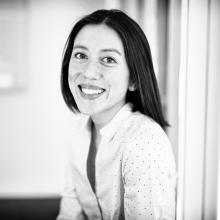Elise Ng-Cordell
Why did you decide to pursue a graduate degree?
In my first job after completing my undergraduate degree, I worked as an educational support assistant for children with learning disabilities. During this year, I saw that for many of the children I worked with, their social and emotional wellbeing shaped and were shaped by their academic challenges, and required just as much support and attention. This experience motivated me to pursue graduate studies so that I could develop a better understanding of the diverse needs of children with neurodevelopmental conditions, and by extension, their families and support networks.
Why did you decide to study at UBC?
I decided to apply to UBC for a number of reasons. UBC's Psychology department has a strong research focus, and I knew that I wanted to develop as a scientist and a clinician. I also really wanted to work with and learn from my supervisor, Dr. Connor Kerns, as our research interests are so well-aligned. Finally, I knew I wanted to study in British Columbia because a lot of my family are based here.
What is it specifically, that your program offers, that attracted you?
The opportunity to receive both research and clinical training was the main thing that drew me to this program. A good understanding of research is incredibly valuable as a clinician, and at the same time, I believe that understanding stakeholders’ needs is an important part of developing impactful clinical research questions.
What was the best surprise about UBC or life in Vancouver?
The best surprise has been the genuine connections and friendships I have made here. Despite starting graduate school remotely during a pandemic, I have felt incredibly supported by my cohort as well as other students, faculty, and staff in my department.
What aspects of your life or career before now have best prepared you for your UBC graduate program?
I took a few years off after completing my undergraduate degree. During this time, I worked as an educational support assistant in Hong Kong, pursued a master's degree in Developmental Psychopathology, then worked as a graduate research assistant in the UK. These experiences helped me gain a deeper understanding of the research process and focus my research interests and goals for graduate school. Also, I think taking a break in my education and the life experiences I had during these years helped me come to graduate school feeling extra motivated.
What advice do you have for new graduate students?
It is good to develop an idea of your graduate school and longer-term career goals so that you can choose among, and make the most of, the many opportunities that come your way. I also think it is important not to put life on hold, and to make time for things that are meaningful to you outside of graduate school.
Learn more about Elise's research
My PhD project will investigate the co-occurrence of anxiety and ADHD among autistic children. In particular, I hope to investigate how anxiety and ADHD symptoms develop in relation to each other, whether they are associated with shared or distinctive cognitive features, and how they shape the clinical needs of autistic children and their families.

